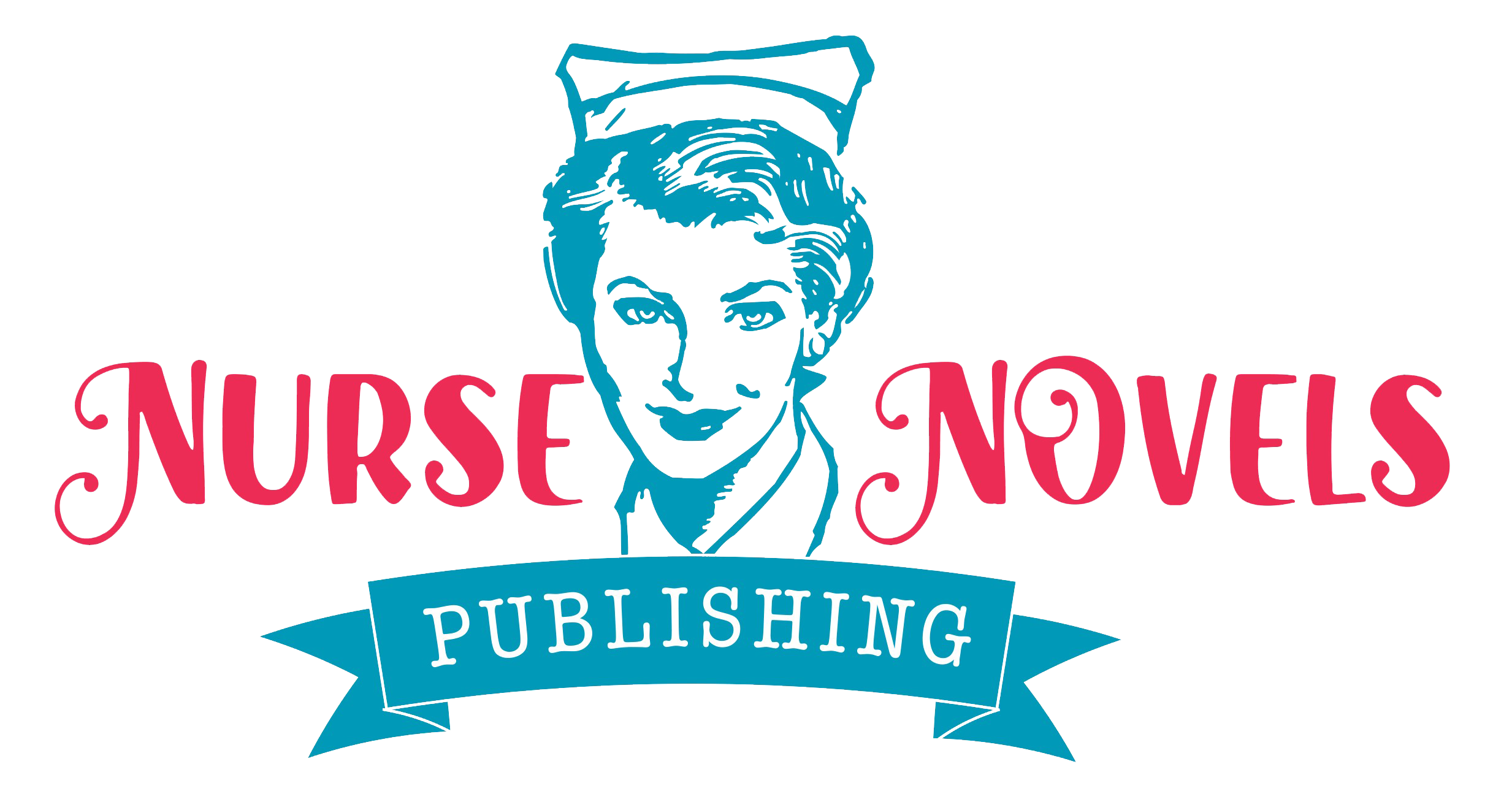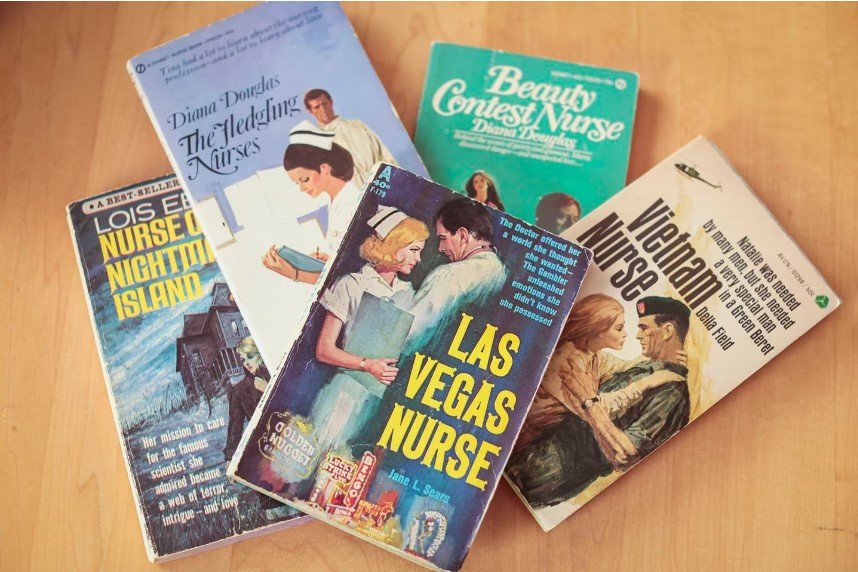This physician assistant is resuscitating
the forgotten ‘nurse romance novel’
Susannah Clark has a love for camp — so she started
Nurse Novels Publishing, a new e-book company based in Melrose
Page 1, Boston Globe, 27 May 2023
Susannah Clark, founder of the new e-book company Nurse Novels Publishing, claims to have the world's largest collection of vintage nurse romance novels (750 and counting). ERIN CLARK/GLOBE STAFF
When Susannah Clark comes home after a 12-hour shift as a physician assistant in surgery, she swaps her white coat for her pajamas and her scalpel for a yellow highlighter. Then she settles into bed to read an old paperback. As the founder of the fledgling e-book company Nurse Novels Publishing, she’s on a mission to digitally revive books that have long been out of print. Not just any books, but a very particular genre: the vintage nurse romance novel.
Take, for instance, “Aloha Nurse,” first published in 1961 and one of many novels Clark has republished as e-books available on Amazon: It’s about a blond bombshell who gets a nursing job at a futuristic hospital in Hawaii and falls for a surgeon-turned-lounge singer at an exclusive Waikiki nightclub.
A view of one of Susannah Clark's bookshelves. ERIN CLARK/GLOBE STAFF
Clark claims to own the world’s largest collection of nurse romance novels in her Melrose home: more than 750, some dating back to the 1940s (and one, “K,” from 1915).
But what exactly is a vintage nurse romance novel? It might be more illuminating to say what it’s not. It’s nowhere close to being woke: A typical plot involves a young woman bagging a doctor, not becoming one; and that woman is nearly always white. It’s no Fabio bodice ripper: Many titles came out in the late ′50s and early ′60s when sex was still a taboo topic.
“It’s basically stories of young women who have careers, which was a kind of a new thing in the ′60s — for women to be able to be independent and have their own lives, their own apartments,” the 56-year-old Clark said during a recent phone interview. She added that most of these nurses are strong heroines “who will argue with the doctor, they’ll fight for what’s right for their patient. They always try to do what’s right, and sometimes that comes at a personal or professional cost . . . but they always win in the end. And that’s one of the things I like about them.”
And she can’t get enough of lines like these:
“If I’m running a fever, baby, you’ve got only yourself to blame.”
“She wore a white uniform like most women wore a Givenchy gown.”
“He spoke in the cheerful way that doctors always do about other people’s pain.”
Since launching her company in November, Clark has republished more than a dozen nurse novels as Kindle books ($5 each, or free under Kindle Unlimited). She has another dozen waiting for new covers, “So they’re going to be coming out fast and furious,” she said.
Along with a graphic designer and marketing person, she has recruited an attorney to advise on contracts with the books’ copyright holders, most often surviving relatives of the authors, who receive one quarter of the profit.
“Aloha Nurse” by Ethel Hamill, “Cover Girl Nurse” by Patricia Libby, and “Green Mountain Nurse” by Ethel Hamill. NURSE NOVELS PUBLISHING
One of those descendants is Bob Roberts, who lives in Manhattan and remembers his maternal grandmother, Jeanne Judson, as a self-sufficient woman who would smoke a Chesterfield with a glass of Seagram’s 7 every day at noon. A former newspaper reporter who’d gone on to contribute to magazines and write serious novels, she started “cranking out these nurse novels” later in her career as a way to support herself, Roberts said in a phone interview.
When Clark reached out around a year ago, “I was completely surprised,” he recalled. “I had an entire shelf of these nurse novels, and stewardess novels. I kept thinking, what am I going to do with all these? You know, I’m not going to read them. . . . But I don’t want to just throw them away.” So he gave them away: Clark picked up a box for her collection and currently has three Judson novels in her catalog, including “City Nurse” from 1959.
Jean Francis Webb III wrote nurse romance novels — “Aloha Nurse” and four others are now e-books — to help put his four sons through college. “He was a writer for money, so in the 1930s when short stories were being published in pulp magazines, he wrote a lot for those, and then as the fashions changed, he would change,” his son, Toby Webb, a retired attorney in Portland, Maine, said in a phone interview.
He noted it was his mother who wore the gray flannel suit to commute to New York City for her public relations job while his father stayed in the suburbs to take care of the boys before school and work at home. By the ′50s, Webb was writing nurse novels under the pen name Ethel Hamill because “he believed for romances, only a woman could really understand affairs of the heart — at least that’s what readers expected,” Toby Webb said. “He was doing whatever he thought the market required.”
Author Jeanne Judson. (Provided by her grandson) FAMILY PHOTO
The market for these paperbacks was “middle-class, white women,” said historian Katie Stollenwerk, who wrote her graduate thesis at University of Wisconsin Milwaukee around the school’s Nurse Romance Novel Collection, with over 425 titles, in the UWM Libraries’ Special Collections. And readers responded — for a while.
Nurse romance novels faded in popularity in the 1970s, following the rise of second-wave feminism. Today, most are out of print, but the intrepid hunter can find them. It was 13 years ago while wandering through an antique shop in rural Maine that Clark spotted a handful of paperbacks “with these hilarious titles . . . the killer was ‘Surf Safari Nurse,’” she said. “And my daughter, who always eggs me on, was like, ‘Mom, you’ve got to buy these!’ So I bought them all, and then I started reading them.”
At the time, Clark was transitioning out of an editing career in magazines and into medicine. She went back to school, earning master’s degrees in science at Tufts University and physician assistant studies at Massachusetts College of Pharmacy and Health Sciences, and started working as a PA in 2010. She found a new calling, but she also missed her old one: writing. So she started reviewing nurse novels on a blog, where she provides author biographies, and one thing led to another.
Susannah Clark, founder of the new e-book company Nurse Novels Publishing, with a portion of what she believes to be the world's largest collection of vintage nurse romance novels. ERIN CLARK/GLOBE STAFF
As a reviewer, Clark has found plenty to critique. “The sexism is out of control,” she said. “Women are routinely assaulted on their dates, and then they’re apologizing to the man for conking him over the head with a rock in order to escape, right? They’re the ‘bad guys.’”
Few nurse novels feature non-white protagonists, and secondary characters of color, when they appear, are often drawn as demeaning stereotypes, Stollenwerk notes. (In 1969, Rubie Saunders published “Marilyn Morgan, R.N.,” becoming one of the first authors of color to center a Black nurse-protagonist.) She also points to depictions of the paternalistic white nurse who just wants to “help” less fortunate characters of color.
The novels are “useful as tools for studying history,” Stollenwerk said in an interview, adding that many couched contemporary issues of the day, from women’s rights to labor rights to the Vietnam War, in formulaic fantasies. “I saw them as a way for people to talk about things that were on women’s minds that they weren’t necessarily having conversations about.”
Susannah Clark, founder of the new e-book company Nurse Novels Publishing, owns some 750 vintage nurse romance novels.
ERIN CLARK/GLOBE STAFF
Clark believes the books she republishes, while flawed relics, are still worth reading and discussing. A warning she includes in the books alerts readers to “attitudes” that may be “disturbing.” Some may decide not to read.
Stollenwerk underscored that sexism and racism are hardly confined to the past or old romance novels. “My biggest concern is that people will read them and just be like, ‘Whoa! We don’t think that way anymore,’ when we still have a lot of racial and social justice issues, especially in health care, and especially in terms of economics and employment opportunities for women,” she said. “It’s media that should be consumed critically.”
For those who do read them, Clark hopes the novels give a glimpse into another era — and an undervalued profession. As it happens, May is National Nurses Month, not that she needs another reason to celebrate nurses.
They are “the backbone of the health care system,” Clark said. “Nurses save my bacon every day.”






